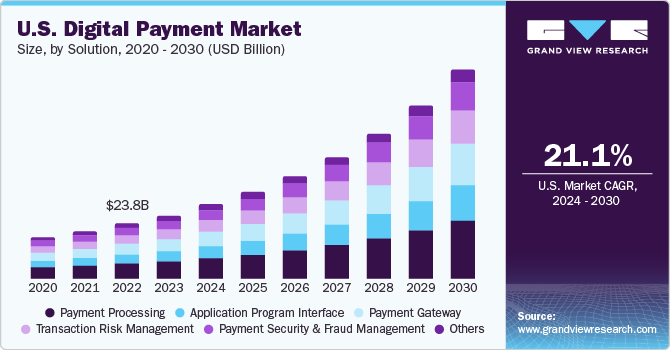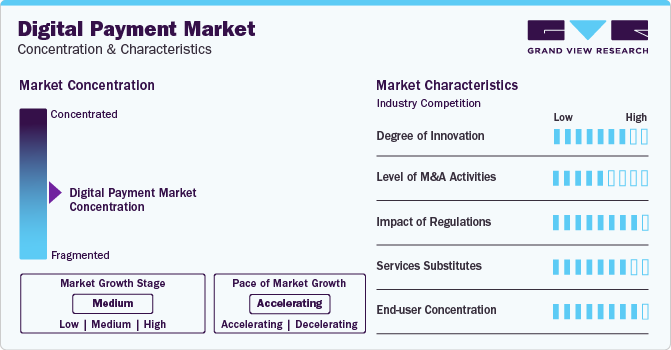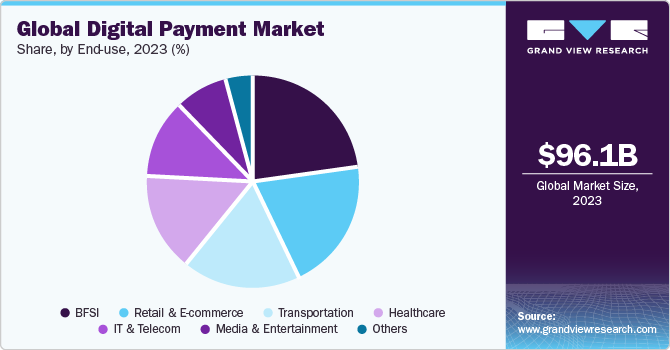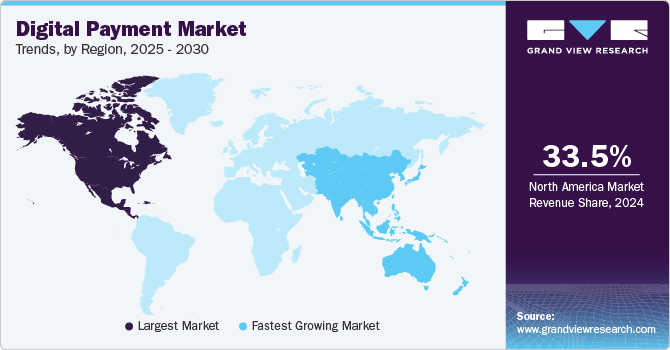- Home
- »
- Next Generation Technologies
- »
-
Digital Payment Market Size, Share & Growth Report, 2030GVR Report cover
![Digital Payment Market Size, Share & Trends Report]()
Digital Payment Market Size, Share & Trends Analysis Report By Solution, By Mode Of Payment (Bank Cards, Digital Currencies, Digital Wallets), By Deployment, By Enterprise Size, By End-use, By Region, And Segment Forecasts, 2024 - 2030
- Report ID: GVR-4-68038-021-7
- Number of Report Pages: 130
- Format: PDF, Horizon Databook
- Historical Range: 2017 - 2022
- Forecast Period: 2024 - 2030
- Industry: Technology
Digital Payment Market Size & Trends
The global digital payment market size was estimated at USD 96.07 billion in 2023 and is expected to grow at a compound annual growth rate (CAGR) of 21.1% from 2024 to 2030. According to the data published by The World Bank, at the end of 2021, over two-thirds of the adults worldwide were making or receiving digital payments, and the number is expected to increase more in the coming years. The growing adoption of digital payments can be attributed to factors such as ever increasing use of smartphones, growing accessibility of internet, rapid acceptance and adoption of cashless transactions during the pandemic, and governments across the world encouraging people to use digital payment methods.

According to Kepios Pte. Ltd., at the start of Q4 2023, 5.30 billion people globally (equivalent to 65.7% of the world’s total population) were using the internet, and around 84% of the mobile phones in use were smartphones. This unprecedented surge in internet accessibility and availability of user-friendly smartphone devices has boosted the growth of the digital payment market. Increased ease in access to internet and technologies powered by it has encouraged more people to embrace digital transactions. This results in enhancing convenience and the market’s growth eventually. Also, presence of businesses on world of web, unparalleled response to it by consumers, and role of digital payments in these transactions has helped digital payments market to further itself towards newer horizons.
Governments across the globe are keen to promote digital payments. For instance, in December 2023, the governments of the Philippines and Ghana joined international organizations, including the United Nations (UN), World Food Program, and UN-housed Better Than Cash Alliance, to initiate a new 'call to action'. Launched at COP28 in the UAE, this global initiative encouraged governments, financial institutions, and the private sector to adopt digital payments for efficient emergency responses. Such initiatives are significantly contributing to market’s growth.
The pandemic spurred a surge in contactless payments as safety concerns drove people to embrace cashless transactions. In April 2020, Mastercard announced that it witnessed a 40% increase in virtual payments, including tap-to-pay and mobile pay. This shift accelerated the adoption of digital payments, favoring cashless methods like mobile wallets and cards. This trend supported the market, emphasizing convenience and hygiene, further driving its widespread acceptance.
Despite the growing adoption of digital payments across the globe, the market faces significant constraints in terms of fraudulent activities in digital modes of payment. According to Merchant Savvy, a UK-based consulting firm, frequency of global payment frauds is expected to increase incessantly and is most likely to cost $40.62 billion by 2027. The rise in payment fraud poses a significant challenge to the market’s growth, necessitating robust security measures and innovative strategies to mitigate risks and ensure consumer trust in digital payment systems.
Market Concentration & Characteristics
The market growth stage is high and the pace is accelerating. The market has been witnessing growth at a rapid pace in recent years. Innovations like cryptocurrency, Buy Now Pay Later, open banking, and embedded finance are reshaping entire concept of transactions through offering entirely new alternatives as payment methods. These transformative trends offer convenience, security, and accessibility to businesses as well as to customers which leads to revolutionizing impact on today’s financial landscape as a whole.

The digital payment industry can be characterized by a moderate level of merger and acquisition (M&A) activities by the leading players. The market players are adopting this strategy in order to expand their product reach, harness technological strengths, and consolidate their position in a continuously changing market while balancing growth and industry integration.
Regulatory considerations have a significant effect on the market. These regulations are shaping the security standards, compliance measures, and operational protocols in the market. They influence market entry, data protection, innovation, which leads to compelling industry adaptation and fostering consumer trust amid evolving regulatory frameworks.
Various substitutes available for digital payments include traditional payment methods such as cash transactions, money orders, and prepaid cards. These methods offer diverse options for transactions, catering to different preferences, situations, and accessibility. Although substitutes, these transaction methods may not exactly fulfill digital payment’s role.
The market is witnessing high end-user concentration across personal and commercial spheres, including end-use industries such as BFSI, healthcare, IT & telecom, retail as well as e-commerce, among others. Users are embracing digital payments for personal finance, online shopping, bill settlements, and diverse financial services, reflecting a broad spectrum of user preferences and needs.
Solution Insights
Payment processing led the market and accounted for 26.18% of the global revenue in 2023. The increasing online transactions have encouraged retailers to embrace payment processing. This way they can offer customers seamless checkout experiences. Players providing payment processing solutions are launching new products that are harnessing the innovation in the market. For instance, in April 2023, GrubMarket, a food tech/e-commerce company operating in the U.S., announced the launch of GrubPay, a significant payment processing platform that facilitates secure and safe payments for food wholesalers and distributors. With the launch, GrubMarket became the first e-commerce platform to offer a fully integrated payment processing solution.
The payment gateway segment is expected to register the fastest CAGR 2024 to 2030. There is an increasing demand for payment gateway solutions from merchants as they enable convenient payment. Furthermore, payment gateways are used for in-store payments to allow customers to make payments via smartphones and the internet. Thus, the growing acceptance of payment gateways among the in-store retail shops drives the segment growth.
Mode of Payment Insights
Point of sales accounted for the largest revenue share in 2023. Retail stores use point-of-sale systems for processing online transactions. These systems offer benefits, such as faster checkout, customized experience, and multiple payment alternatives. Retailers worldwide are now adopting cloud-based point of sale systems to increase their efficiency and improve service effectiveness.
Net banking is expected to register a significant CAGR during the forecast period. The benefits offered by net banking, including ease of banking, improved time efficiency, and activity tracking, are among the major factors driving the segment growth. As a result, various countries across the world are witnessing an increase in net banking users. According to the statistics provided by Forbes Media LLC, as of 2022, approximately 78% of U.S. adults in the region preferred to use financial services via mobile applications or online websites over use of other modes.
Deployment Insights
The on-premise segment accounted for the largest market revenue share in 2023. The on-premise deployment of digital payment provides organizations with complete control over applications and systems, which can be easily managed by the organization’s IT staff. Moreover, the increased occurrence of financial frauds amid the COVID-19 pandemic is also one of the major factors driving the demand for on-premise solutions among organizations. According to the statistics provided by Merchant Savvy, a merchant service provider, global payment frauds have increased from USD 9.84 billion in 2011 to USD 32.39 billion in 2020; it is projected to reach USD 40.62 billion by 2027, i.e. 25% increase from 2020.
The cloud segment is expected to register a significant growth by year 2030. The unremitting rollout of smart city projects, coupled with the rising number of unmanned retail stores, is one of the major factors driving the growth of the segment. Furthermore, efforts taken by payment companies to launch cloud-based payment products are driving the market’s growth. For instance, in November 2023, Payment24, international fuel payment solutions provider based in Cape Town, South Africa announced the launch of a cloud-based financial product named Cloud Switch. This cloud-based payment platform is fully integrated, hardware-less payment switch that supports various payment methods and is diligently designed to serve identified needs of retailers, merchants, fuel retailers, and acquiring banks.
Enterprise Size Insights
Large enterprises accounted for the largest revenue share in 2023. Large retail stores increasingly demand digital payment solutions to enable their customers to conduct payments by maintaining social distancing. Digital payment methods, such as smart banking cards, point of sales solutions, and e-wallets, are used by retailers to reduce checkout time. Enterprises are increasingly adapting to the post pandemic world while maintaining visible and active presence in online markets. At the same time, retailers are also letting their underlying assumptions go and adapting to changing approach by providing innovative payment solutions for customers.
For instance, in October 2023, TodayPay announced a payment technology solution that is designed to help merchants offer their customers instant refunds in multiple payment choices. Such initiatives are harnessing the segment’s growth as it results in increased checkout conversations, enhanced sales velocity and reduced disputes. As this market experiences entry of too many new players over course of period, service differentiation is what most of the digital payment platforms tend to focus on in order to attract more users. This fuels innovation and user-friendly experiences.
The small & medium enterprises segment is expected to grow at a high CAGR by 2030. SMEs are replacing expensive, prone to errors, inefficient paper-based billing methods by digital methods. Payment solution providers are focusing on launching new products to cater to such basic requirements of SMEs. For instance, in August 2023, Melio, a prominent B2B payments platform announced the launch of Pay Over Time, product that enables small businesses to pay businesses and vendor bills in monthly installments. Additionally, the product powered by Credit Key is aimed at providing small businesses with instant access to capital of up to USD 50,000 through their Melio account after examining their eligibility. Such instances are contributing to segment’s progres.
End-use Insights
The BFSI segment led the market in terms of revenue share in 2023. The rising demand for digital remittance for domestic and cross-border transactions is encouraging banks to adopt digital payment solutions. Moreover, banks are also enhancing their offerings to compete with digital payment solutions providers, such as Google, Amazon, and Facebook. For instance, in October 2023, U.S. Bank announced the launch of Avvance, a multi-channel embedded point of sale lending solution.

The retail & e-commerce segment is anticipated to expand at the highest CAGR from 2024 to 2030. The growing use of mobile-based payment solutions among customers for retail payments is one of the major factors driving the segment's growth. At the same time, the rising number of unmanned retail stores worldwide is also driving market growth. According to an article published by NXP Semiconductors, the number of unmanned stores was estimated to reach 44,138 globally by 2023. The growing number of unmanned stores is creating demand for digital payment solutions.
Regional Insights
North America dominated the market and accounted for a revenue share of 33.9% in 2023. The regional market benefits from factors such as the growing deployment of technology improvements in smart parking meters. For instance, in January 2022, Des Moines, a city in Iowa, witnessed the launch of a new parking payment system in some parts of the city. The new USD 3.5 million system which will enable motorists to park in any spot and pay either through a sidewalk pay station or an app. Such initiatives are expected to drive the region’s growth.

Europe is anticipated to witness a significant CAGR from 2024 to 2030. The regional growth can be attributed to the efforts taken by banks in Europe to launch a European payment initiative aimed at effectively creating a unified payment solution for merchants and consumers. Such initiatives are expected to harness the regional market’s growth. Moreover, the digital campaign launched by the Italian government to increase electronic payments in the country is also propelling the regional growth.
Digital Payment Company Insights
Some of the key players operating in the market include PayPal Holdings Inc.; Global Payment Inc.; ACI Worldwide, Inc.; and Mastercard.
-
PayPal Holdings Inc. is a digital payment and technology platform company that enables mobile and digital payments on behalf of merchants as well as customers. The company is focused on providing simpler and safer ways for businesses of all sizes to accept payments from mobile devices, merchant websites, offline retail locations, applications, and other platforms.
-
Mastercard Incorporated is the second-largest payment-processing corporation worldwide which connects digital partners, merchants, governments, financial institutions, consumers, and other entities globally. Mastercard Incorporated also provides digital payment solutions, such as Masterpass, a global digital payment service that allows consumers to make fast, simple, and secure transactions on any device and across any channel.
-
Authorize.Net, Adyen, Financial Software & Systems Pvt. Ltd., Novatti Group Pty Ltd., and Total System Services LLC are some of the emerging market participants.
-
Adyen develops payment platforms for businesses across the globe. The company’s offerings include authorized payment solutions that merchants across in-store, mobile, and online sales channels can use. These solutions are delivered to the merchants by connecting them directly with Mastercard, Visa, and other payment gateways.
-
Financial Software & Systems Pvt. Ltd. is a payment gateway service provider that enables central regulators, banks, financial intermediaries, and payment and merchant associations to leverage the opportunities presented by the digital world.
Key Digital Payment Companies:
The following are the leading companies in the digital payment market. These companies collectively hold the largest market share and dictate industry trends. Financials, strategy maps & products of these digital payment companies are analyzed to map the supply network.
- Aliant Payments
- Aurus Inc.
- Adyen
- Financial Software & Systems Pvt. Ltd.
- PayPal Holdings Inc.
- Novatti Group Pty Ltd.
- ACI Worldwide, Inc.
- Global Payments Inc.
- Wirecard
- Authorize.Net
Recent Developments
-
In December 2023, Visa Inc. declared a definitive agreement to secure a majority stake in Prosa, a prominent payments processor in Mexico, with the aim of accelerating the acceptance of secure and inventive digital payments within the nation. Under this agreement, Prosa will maintain its autonomy as a company, retaining its technological framework, while Visa plans to improve Prosa's array of products by introducing novel digital solutions.
-
In November 2023, PayU, the foremost provider of digital payment solutions in India, unveiled the introduction of its three revolutionary mobile app Software Development Kits (SDKs). These advancements are specifically crafted to meet the demand for smooth payment encounters on mobile gadgets, effectively enhancing transaction success rates by up to 56%.
-
In November 2022, Conduent Incorporated, a worldwide technology enterprise, introduced its latest digital integrated payments hub. This innovation is geared towards granting businesses and public sector agencies access to secure, efficient, and expedited methods for sending, receiving, or requesting payments.
Digital Payment Market Report Scope
Report Attribute
Details
Market size value in 2024
USD 114.41 billion
Revenue forecast in 2030
USD 361.30 billion
Growth rate
CAGR of 21.1% from 2024 to 2030
Base year of estimation
2023
Historical data
2017 - 2022
Forecast period
2024 - 2030
Report updated
January 2024
Quantitative units
Revenue in USD billion and CAGR from 2024 to 2030
Report coverage
Revenue forecast, company market share, competitive landscape, growth factors, and trends
Segments covered
Solution, mode of payment, deployment, enterprise size, end-use, region
Regional scope
North America; Europe; Asia Pacific; Latin America; Middle East & Africa
Country scope
U.S.; Canada; U.K.;, Germany; France; China; Japan; India; South Korea; Australia; Brazil; Mexico; Kingdom of Saudi Arabia (KSA); UAE; South Africa
Key companies profiled
Aliant Payments; Aurus Inc.; Adyen; Financial Software & Systems Pvt. Ltd.; PayPal Holdings Inc.; Novatti Group Pty Ltd.; ACI Worldwide, Inc.; Global Payments Inc.; Wirecard, Authorize.Net
Customization scope
Free report customization (equivalent to up to 8 analysts working days) with purchase. Addition or alteration to country, regional, and segment scope
Pricing and purchase options
Avail customized purchase options to meet your exact research needs. Explore purchase options
Global Digital Payment Market Report Segmentation
The report forecasts revenue growth on global, regional, and country levels while providing an analysis of the latest industry trends in each of the sub-segments from 2017 to 2030. For this study, Grand View Research has segmented the digital payment market report based on solution, mode of payment, deployment, enterprise size, end-use, and region:
-
Solution Outlook (Revenue, USD Billion, 2017 - 2030)
-
Application Program Interface
-
Payment Gateway
-
Payment Processing
-
Payment Security & Fraud Management
-
Transaction Risk Management
-
Others
-
-
Mode of Payment Outlook (Revenue, USD Billion, 2017 - 2030)
-
Bank Cards
-
Digital Currencies
-
Digital Wallets
-
Net Banking
-
Point of Sales
-
Others
-
-
Deployment Outlook (Revenue, USD Billion, 2017 - 2030)
-
Cloud
-
On-premise
-
-
Enterprise size Outlook (Revenue, USD Billion, 2017 - 2030)
-
Large Enterprises
-
Small & Medium Enterprises
-
-
End-use Outlook (Revenue, USD Billion, 2017 - 2030)
-
BFSI
-
Healthcare
-
IT & Telecom
-
Media & Entertainment
-
Retail & E-commerce
-
Transportation
-
Others
-
-
Regional Outlook (Volume, Billion Transactions; Revenue, USD Billion, 2017 - 2030)
-
North America
-
U.S.
-
Canada
-
-
Europe
-
U.K.
-
Germany
-
France
-
-
Asia Pacific
-
China
-
Japan
-
India
-
South Korea
-
Australia
-
-
Latin America
-
Brazil
-
Mexico
-
-
Middle East & Africa
-
Kingdom of Saudi Arabia (KSA)
-
UAE
-
South Africa
-
-
Frequently Asked Questions About This Report
b. The global digital payment market size was estimated at USD 96.07 billion in 2023 and is expected to reach USD 114.41 billion in 2024.
b. The global digital payment market is expected to grow at a compound annual growth rate of 21.1% from 2024 to 2030 to reach USD 361.30 billion by 2030.
b. North America dominated the digital payment market with a share of 33.98% in 2023. This is attributable to the existence of a large number of digital payment solution providers in the region. The expansion of the mobile commerce industry, coupled with the developed digital economy in North America, are additional factors driving the market.
b. Some key players operating in the digital payment market include Total System Services, Inc.; Wirecard AG; Novetti Group Limited; PayPal Holdings Inc.; ACI Worldwide Inc.; and Adyen N.V.
b. Key factors that are driving the digital payment market growth include increasing government initiatives for the promotion of digital payments and the growing penetration of smartphones.
Share this report with your colleague or friend.
![gvr icn]()
NEED A CUSTOM REPORT?
We can customize every report - free of charge - including purchasing stand-alone sections or country-level reports, as well as offer affordable discounts for start-ups & universities. Contact us now
![Certified Icon]()
We are GDPR and CCPA compliant! Your transaction & personal information is safe and secure. For more details, please read our privacy policy.
We are committed towards customer satisfaction, and quality service.
"The quality of research they have done for us has been excellent."





